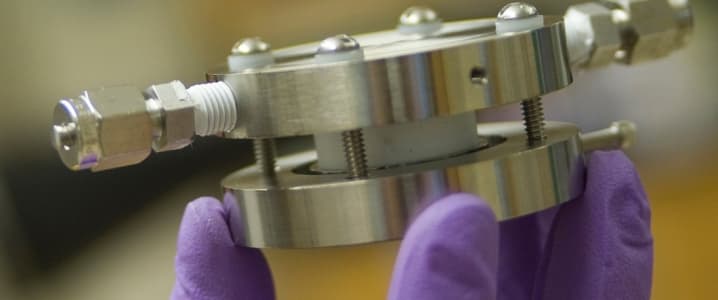University of Southern California (USC) scientists have developed an alteration to the lithium-sulfur battery that could make it more than competitive with the lithium-ion battery. The solution is for one of the biggest stumbling blocks to the next wave of rechargeable batteries – small enough for cellphones and powerful enough for cars.

Lithium-sulfur battery with Mixed Conduction Membrane barrier to stop polysulfide shuttling. Image Credit: Sri Narayan and Derek Moy at USC. Click image for the largest view.
In a paper published in the January issue of the Journal of the Electrochemical Society, Sri Narayan and Derek Moy of the USC Loker Hydrocarbon Research Institute outline how they developed an alteration to the lithium-sulfur battery that could make it more than competitive with the industry standard lithium-ion battery.
The lithium-sulfur battery, long thought to be better at energy storage capacity than its more popular lithium-ion counterpart, has been hampered by its short cycle life. Currently the lithium-sulfur battery can be recharged 50 to 100 times – impractical as an alternative energy source compared to 1,000 times for many rechargeable batteries on the market today.
The solution devised by Narayan and lead author and research assistant Moy is something they call the “Mixed Conduction Membrane,” or MCM, a small piece of non-porous, fabricated material sandwiched between two layers of porous separators, soaked in electrolytes and placed between the two electrodes.
The membrane works as a barrier in reducing the shuttling of dissolved polysulfides between anode and cathode, a process that increases the kind of cycle strain that has made the use of lithium-sulfur batteries for energy storage a challenge. The MCM still allows for the necessary movement of lithium ions, mimicking the process as it occurs in lithium-ion batteries. This novel membrane solution preserves the high-discharge rate capability and energy density without losing capacity over time. Related: The Discounts Are Over: U.S. Shale Is About To Get More Expensive
At various rates of discharge, the researchers found that the lithium-sulfur batteries that made use of MCM led to 100 percent capacity retention and had up to four times longer life compared to batteries without the membrane.
Narayan, senior author and professor of chemistry at the USC Dornsife College of Letters, Arts and Sciences said, “This advance removes one of the major technical barriers to the commercialization of the lithium-sulfur battery, allowing us to realize better options for energy efficiency. We can now focus our efforts on improving other parts of lithium-sulfur battery discharge and recharge that hurt the overall life cycle of the battery.”
Professor Narayan summed it up well. But left out the huge closing of the gap he and Moy have accomplished cutting the needed improvement from 10 to 20 times down to 3 to 5. The Lithium Sulfur technology may well soon be the better alternative.
ADVERTISEMENT
By New Energy And Fuel
More Top Reads From Oilprice.com:
- What Will It Take For Oil To Breakout?
- Oil To $70? Or Down To $30?
- Statoil Sues Researcher For Allegedly Stealing Secret Frack Tech


















